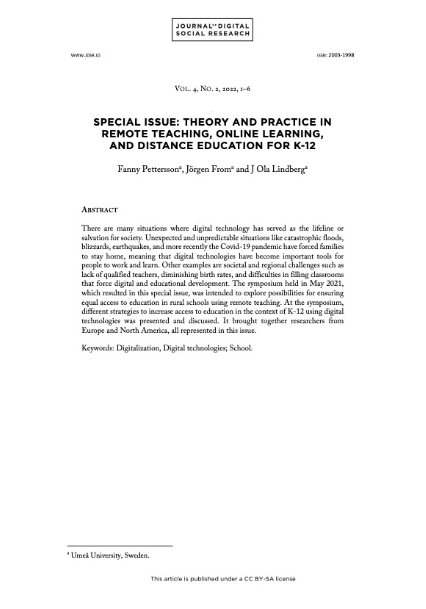Special Issue: Theory and Practice in Remote Teaching, Online Learning, and Distance Education for K-12
DOI:
https://doi.org/10.33621/jdsr.v4i2.139Abstract
There are many situations where digital technology has served as the lifeline or salvation for society. Unexpected and unpredictable situations like catastrophic floods, blizzards, earthquakes, and more recently the Covid-19 pandemic have forced families to stay home, meaning that digital technologies have become important tools for people to work and learn. Other examples are societal and regional challenges such as lack of qualified teachers, diminishing birth rates, and difficulties in filling classrooms that force digital and educational development. The symposium held in May 2021, which resulted in this special issue, was intended to explore possibilities for ensuring equal access to education in rural schools using remote teaching. At the symposium, different strategies to increase access to education in the context of K-12 using digital technologies was presented and discussed. It brought together researchers from Europe and North America, all represented in this issue.
References
Barbour, M. K. (2019). The landscape of K-12 online learning: Examining the state of the field. In M. G. Moore & W. C. Diehl (Eds.), Handbook of distance education (4th ed.) (pp. 521–542). Routledge.
Bhabha, H. (1994) The Location of Culture. London: Routledge.
Bond, M. (2021). Schools and emergency remote education during the COVID-19 pandemic: A living rapid systematic review. Asian Journal of Distance Education, 15(2), 191–247. DOI:10.17632/nw28sb4mzx.1
Fischer, G., Lundin, J., & Lindberg, J. O. (2020). Rethinking and reinventing learning, education and collaboration in the digital age—From creating technologies to transforming cultures. The International Journal of Information and Learning Technology, 37(5), 241–252. DOI:10.1108/ijilt-04-2020-0051
Fransson, G., Holmberg, J., Lindberg, J.O., & Olofsson, A.D. (2019). Digitalise and capitalise? Teachers’ self-understanding in 21st-century teaching contexts. Oxford Review of Education, 45(1), 102–118, DOI: 10.1080/03054985.2018.1500357
From, J., Pettersson, F., & Pettersson, G. (2020). Fjärrundervisning - en central del i skolans digitalisering. Pedagogisk forskning i Sverige, 25(2–3), 69–91. DOI: 10.15626/pfs25.0203.04
Ilomäki, L., & Lakkala, M. (2020). Finnish upper secondary school students' experiences with online courses. Education in the North, 27(2), 73–91. DOI: 10.26203/jsaz-8714
Lindfors, M., & Pettersson, F. (2021). K–12 Students’ Experiences of the Synchronous Remote Teaching and Learning Environment. Journal of Online Learning Research, 7(3), 249-268.
Stenman, S., & Pettersson, F. (2020). Remote teaching for equal and inclusive education in rural areas? An analysis of teachers’ perspectives on remote teaching. International Journal of Information and Learning Technology, 37(3), 87–98. DOI: 10.1108/IJILT-10-2019-0096
Yandell, J. (2020). Learning under Lockdown: English teaching in the time of Covid-19. Studies in Culture and Education, 27(3), 262–269. DOI: 10.1080/1358684X.2020.1779029

Downloads
Published
Issue
Section
License
Copyright (c) 2022 The Authors

This work is licensed under a Creative Commons Attribution-ShareAlike 4.0 International License.



